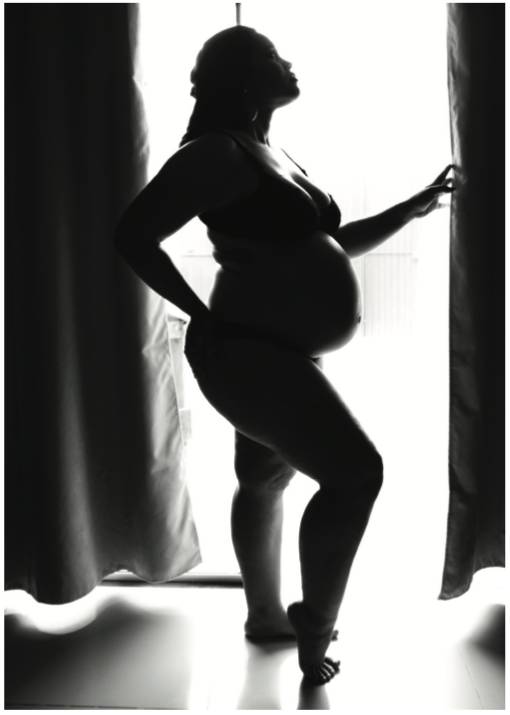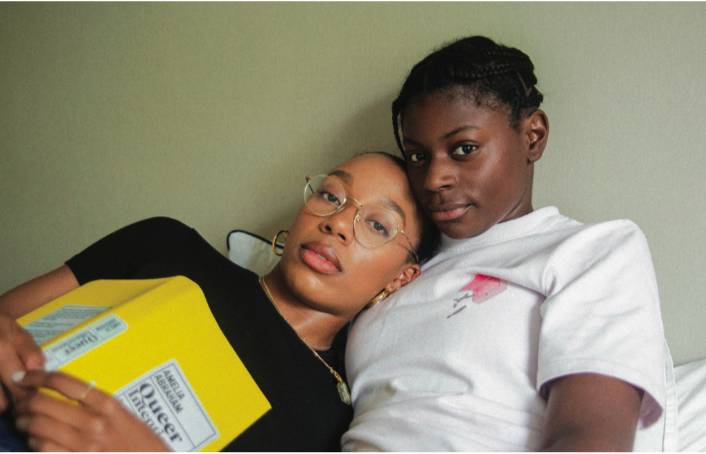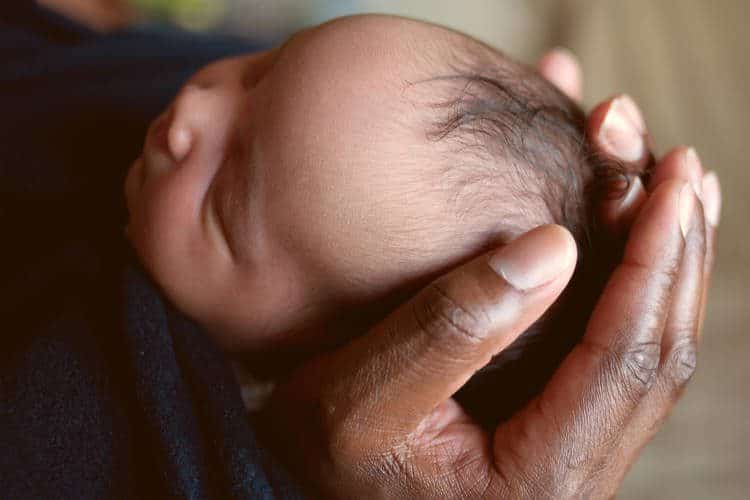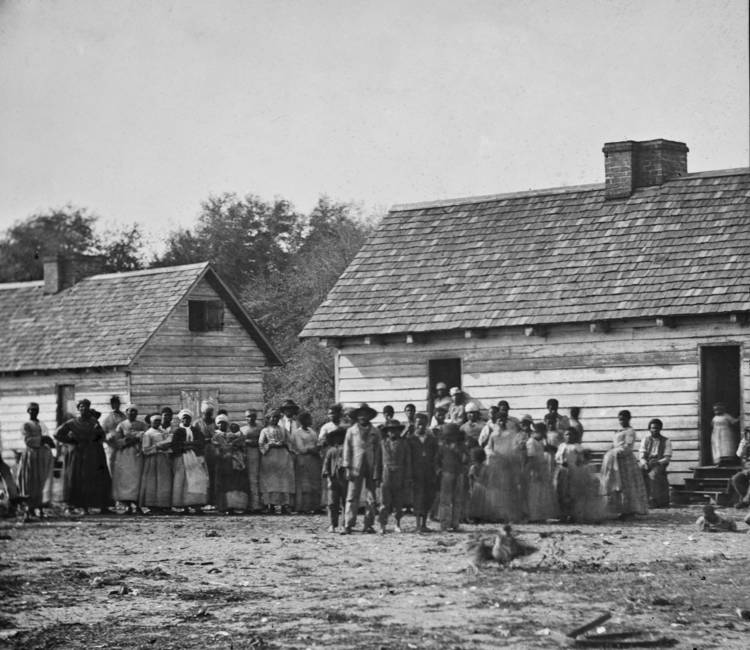Markita Mays, Theresia Oklan, Glamarys Acevedo, and Suzanne N. Mungalez, University of California, San Francisco

Abstract
Birthing disparities in the United States are racialized and consistently show that Black women and Black birthing people face the highest risk. This article presents a historical context from which these disparities grew to acknowledge the roots of modern day institutionalized and systemic racism in maternal health care that undeniably effect the outcomes seen. The solution to eliminating the racial birthing disparities is multipronged. The authors share a racial concordant, integrated behavioral health model of perinatal care that promotes prioritizing culture-specific knowledge, traditions, and birthing practices that can be integrated in hospital and medical settings to buffer expecting Black families from obstetric oppression and violence. A call to action to standardize sanctuary birthing for Black families in our medical systems and the appointment of Black leadership to lead the charge is recommended.
The numbers tell no lie, the cry is piercing, and the headlines continue to surface highlighting disproportionate complications and fatalities for Black women and Black people birthing in the United States. Furthermore, there is a growing awareness that acknowledges the historical context from which these disparities grew—the historical context of oppression; structural, systemic, and personally mediated racism; discrimination; and anti-Blackness. Black women and Black birthing people’s bodies have been bearing the toll of violence, domination, inhumanity, inequality, and lack of autonomy for centuries.
In this article we speak directly to Black women, Black mothers, and Black birthing people. Your body is a road map, carrying a genetic coding of history, wisdom, resilience, and healing. Undoubtedly the solution to eliminating the racial birthing disparities is multipronged. A specific angle the authors propose is elevating a return to an intuitive subterranean wisdom around birthing practices that has transcended across generations.
If history has taught us anything, it has taught us that WE are the ones we’ve been waiting for. WE are our own resource, WE are our own experts, and WE are our solution.
There’s been a building movement with deliberate and intentional action for the reproductive health of Black families taken up fiercely by Black providers and Black advocates who work across the varying touches of birthing. Black leadership is reclaiming and finding their positions of power in grassroots efforts, innovative programs, and historically oppressive large systemic institutions.
WE are here to reclaim our wellness and to ensure our livelihood.
I wanted a birth that was as loud or quiet, messy, active, or still as it needed to be. I wanted a birth that was not institutionalized and predictable, not conquered or colonized, but instead self-determined and free. I wanted my black child to enter this crazy world on his own terms, in his own time, if he could. I wanted that for him. For myself I wanted to be part of a larger ritual and practice that women have performed for centuries. I wanted to allow my body to do what it needed to do, and I wanted to learn and experience my own body’s potential. (Saleh-Hanna, 2016, p. 47)
History of Black Birthing in America
There are some experiences that are simultaneously ancient, current, foreign, and yet familiar. The impact of cultural and transgenerational trauma operates within these parameters embedding a living in beliefs, expressions, and norms. Cultural trauma occurs when members of a collectivity have been subjected to a horrendous event that leaves deep-rooted marks upon their group consciousness, marking their memories forever and changing their future identity in fundamental and binding ways (Alexander, 2004). Transgenerational trauma references the symptoms and behaviors of trauma survival that pass on to children, who then further pass along the family line and inevitably through ingrained social behavioral patterns, sustaining through many generations (Dekel & Goldblatt, 2008).
Both theoretical concepts are provided for Black families to hold as a framework when trying to decipher their experiences in modern times. You did not need to be present for chattel slavery, Reconstruction, Jim Crow, or the early civil rights movement—the impact of these adverse cultural experiences was passed down and lives in your gut, your cells, your intuition. It’s okay to trust the questions that might emerge when interfacing with the society it created:
Do you mean well by me? Will you listen to me when I communicate a need or concern? Will you take the time to communicate all options available so I can determine what I prefer in my delivery of care?
Am I just another black face or do you pay attention to who I am? Is your medical advice
generic or specific to me? Do you care to know/willing to hear what I deem important to share about my life/family story?
Are you aware of and do you acknowledge the traumatic and oppressive history of Black people in the US? Do you understand the long-term sequelae and systemic implications of this history on Black lives across generations? Are you holding all this as vital contextual information to inform your development/provision of care to Black patients? Have you examined the ways that you enact provider bias, microaggressions, and racist behavior (conscious or unconscious)?
Ultimately, all these questions boil down to one: Can I trust you?
The body carries the histories of past pains and present assaults. Unresolved trauma, abuse, and fear are carried in our minds, spirits and bodies. This imprint of fear becomes a part of our lives, so much so that we hold onto it tightly. (Perez, 2016, p. 106)
To validate the experiences of Black women and Black people birthing and parenting today, history’s truth can shed light on the shadows that have crept their way into modern maternal health care. Important historical echoes rooted in maternal health care include: (1) the use of the enslaved Black women’s body as an experimental playground for the study of obstetrics and gynecology (Cooper Owens, 2017; Fisher, 1968; Washington, 2008); (2) domination over and the utilization of the Black women’s womb as a tool to sustain the system of slavery through reproduction (Taylor, 2020); (3) enduring extreme physical labor, severe physical punishment, and violent abuse, including rape—pregnant or not pregnant (Roberts, 1998); (4) forced separations and displacements between mothers and children (Cooper Owens & Fett, 2019); and (5) routinely dismissing or ignoring Black women’s physical and emotional pain (Hoffman et al., 2016).
These echoes are ingrained in the collective memory of Black women and Black people birthing and have protectively seeded a reluctance to trust patriarchal medical establishments, White bodied medical practitioners, and medical providers of color with unexamined internalized racism.
The development of medicalized childbirth progressed by the forced experimentation on the bodies of Black women in the name of medical science rooted in White supremacy (Cooper Owens, 2017), and while the field advanced itself, extracting procedures and practices used today, it had no intentions to untangle the intolerable attitudes, beliefs, and racism it built itself upon.
The unacknowledged histories and harms of maternal and reproductive health care for Black women and Black people birthing are forever ringing the alarms in our bodies and our psyche. To be fully conscious of them is to be fully present with trauma and healing simultaneously. The greatest predictor of the past repeating itself is a lack of awareness of what was and a disconnect from the emotional state these experiences invigorated.
If you are silent about your pain, they’ll kill you and say you enjoyed it. (Hurston, 1937)
Here’s the thing. WE no longer have to be silent about our pain. WE no longer have to lay down at the foot of death. WE no longer have to swallow what is intolerable. WE are here to contend with the wedded relationship between history, medicine, and science and demand that it reckons with the inhumane and cold context in which it was established.

EMBRACE weaves ancestral and spiritual birth preparation practices throughout the pregnancy and labor and delivery, to invoke positive and protective blessings. Photo: Liderina/shutterstock
WE are here to reclaim humanity, love, and wellness for the reproduction of Black lives.
Reclaiming Our Wellness—EMBRACE Perinatal Care for Expecting Black Families
Embedded in the DNA of people of African descent is a sense of communalism. The passing down of knowledge, culture, and tradition occurs through community, by being in relationship with it and seeking it as an anchor of understanding self. Birthing practices, like all things in life, are culture specific, and the cultural birthing practices of African descendants remain despite the horrors of enslavement. The culture-specific phenomena of birthing have not always found their way to or been wholly accepted in medical institutions. According to the Centers for Disease Control and Prevention, in 2019, there were around 3.7 million births in the US and 15% of these births were to Black mothers and Black birthing people, with the majority being birthed in hospital settings. As the systemic pushout and undervaluing of granny midwives assisting childbirths and the move toward racial integration in the US occurred, post early civil rights, one must question: How are Black families able to access and benefit from culture-specific knowledge in medical institutions? Who are the guardians of history and the culture keepers in these systems pulling from equally valuable knowledge and practices alongside “scientific medical” standards? Science gives numbers and data, but those things alone cannot account for the totality of knowledge needed to psychologically, emotionally, and spiritually be equipped for humane and successful birthing. In addition, the necessity for shifting racially biased beliefs, attitudes, and judgments that are conditioned by society and inevitably indoctrinated in providers and practitioners are key to eliminating experiences of reproductive oppression and obstetric violence.
WE are the ones we have been waiting for. (Jordan, 1980)
EMBRACE, a perinatal model of care for expecting Black families, operating out of the University of California, San Francisco, was developed to combat the ills that contribute to the outcomes and disparities of Black maternal health. It was spearheaded in 2018 by Black obstetric and infant mental health providers and developed in collaboration with the Black families it served.
The mission of EMBRACE is to give Black pregnant people and their families an opportunity to receive prenatal care from an intentional angle of racial consciousness. The program seeks to sustain and support the creation of Black lives by reclaiming health, wellness, and self-determination for Black birthing.
The word Sankofa, which means “to retrieve” or “to go back and fetch it,” is used by the Akan-speaking people of Ghana as a grammatical imperative, meaning that to advance, one must reflect on and reclaim traditional cultural ideas (Temple, 2010).
Somewhere in the African past, / before the guns, before the / shackles, / before the kidnapping… / there were the women / who caught the babies / and guided them into the world, / with gentle, loving hands (Greenfield, 2019, sec. Africa to America, p. 8).
EMBRACE is perinatal care deeply rooted in the spirit of Sankofa. EMBRACE is returning to catching the babies and guiding them into the world with gentle and loving hands.
Since its inception, EMBRACE has evolved and expanded its offerings to include group prenatal care, 1:1 prenatal care, 1:1 perinatal mental health services, lactation consultation, and postpartum community gatherings. These offerings are providing crucial and specific components: race-concordant medicine and mental health, interdisciplinary teams, patient-driven care, culturally specific holistic wellness, racially conscious psychoeducation, and extension of care for up to 1 year postpartum.
As a medical system birthing alternative, EMBRACE emphasizes the care and focus on the whole birthing person/family, holding in mind their history and stories, and the multiple environments they navigate in a Black body. EMBRACE providers also acknowledge the history of these various environments, from the nursing teams they interact with, to triage and screening team biases, to the larger society and the events happening in the surrounding world.
The prenatal curriculum, provider dialogues, and therapeutic topics covered in every offering encompass psychological, emotional, developmental, relational, financial, and physiological aspects of well-being. EMBRACE’s intentional choice of inviting only Black providers, including lactation consultants, doulas, pediatricians, and anesthesiologists, to share their knowledge with EMBRACE families, decreases the need—conscious or unconscious—to code switch and enhances the group space to function not just as a supportive collective but also as a perinatal psychoeducation course. In addition to learning information that will prepare them for the physiological aspects of pregnancy, labor, and delivery, these families are also held in developing coping skills for “living while Black,” including somatic healing practices such as prenatal yoga, twerking, belly breathing, guided meditation, and positive affirmations. Families are also supported as they foster deeper understanding of intergenerational transmission of ghosts and angels in the nursery and reflect on the transition to parenthood. In addition, in the preparation for parenthood and the reality of birthing a Black child, EMBRACE emphasizes and affirms a racial socialization that will pave a paradigm rooted in pride and knowledge of self. Lastly, because birthing is sacred and the stripping of spirituality from the medicalized process is a cultural deficit and harm, EMBRACE weaves ancestral and spiritual birth preparation practices throughout the pregnancy and labor and delivery, to invoke positive and protective blessings.
It is important to acknowledge that while EMBRACE’s care is predominately delivered in group settings, each family is held as individual dyads with separate care plans that allow for supportive modification due to unforeseen medical complications arising.
As a 3-year pilot program, to date, EMBRACE’s descriptive evidence of successful outcomes include:
- Cesarean section rates: 70% of our families were medically eligible for a vaginal delivery, and 81% of those families had uncomplicated vaginal deliveries, for a C-section rate of 19%. This is an exceptionally low C-section rate, especially for Black women, who in the US have a C-section rate of 35% (Huesch & Doctor, 2015).
- Gestational age at delivery: Our average gestational age at delivery was 38.9 weeks. Of note, Black women are most likely to have a preterm birth with 14% of all Black births in the US being before 37 weeks (Martin & Osterman, 2018).
- Birth weight: Our average birthweight of newborns was 6.81 lbs. In the US, Black women on average give birth to lower weight babies, defined as 5.5 lbs or below (Collins et al., 2004).
- Breastfeeding: 95.7% at 6 weeks postpartum. Nationally in the US this rate is approximately 60% (Centers for Disease Control and Prevention, 2020).
The promising outcomes thus far have assured us that we are on the right track for decreasing disproportionate maternal and infant mortality outcomes in hospital systems.

Families are also supported as they foster deeper understanding of intergenerational transmission of ghosts and angels in the nursery and reflect on the transition to parenthood. Photo by Isabella Angélica on Unsplash
In the example that follows, you will be guided through a family’s journey with EMBRACE, from initial greeting with providers to the initial Earthside greeting of their son. This story is offered to show the subtle and not-so-subtle harms of obstetric violence, unforeseen perinatal complications, and the role of a program like EMBRACE in empowering a family to their rights of dignity, choice, autonomy, and self-determination for their birthing.
I Call Him, “My Son”
They were excited, nervous, and ready for parenthood. The pregnancy was unplanned but very much so wanted when they found out they were expecting. Both Mother- and Father-to-be were 27 years old, identified as African-American, and natives to the Southeast Sector of San Francisco, California.
Mom was referred at 14 weeks into her pregnancy, had no prior significant health concerns, was a nonsmoker, and exercised regularly. She was attracted to EMBRACE Group Perinatal Care when she was told the team was all Black. During intake, she shared that upon hearing this information, she immediately felt a sense of relief and knew she could just talk the way she needed to talk. She said she worked in a predominately White space and had become a master at “code switching”—she was thankful to not have to code switch to receive care that would support her during this pregnancy. Mom came to group sessions with an eagerness to build community with other Black women. Her partner was extended an “open door” policy and attended the group sessions when his work schedule allowed him to do so. He additionally found ease in connecting with other young, Black, first-time fathers.

Science gives numbers and data, but those things alone cannot account for the totality of knowledge needed to psychologically, emotionally, and spiritually be equipped for humane and successful birthing. Photo by Shingi Rice on Unsplash
In the group, Mom was an active participant and grew into her voice and space taking. She evolved from being the last person to speak up to the first person to offer her reflections, insights, or experiences during her pregnancy. When Dad was unable to attend, she fiercely took notes, and at times would either use video chat so he could join or ask the facilitators to repeat certain things so she could record a voice memo for him; She wanted to be sure he was as equally prepared for the arrival of their child as she was. Both Mom and Dad were not shy about the future they visioned for their unborn child and specific about the kind of village they wanted to create for their unborn Black child. Their visions centered around providing baby with love, acknowledging their lineage and family legacy, creating reflective space around their baby and within their relationship, as well as protecting their baby in a world that will see them as less than and unworthy because they are Black.
Mom shared,
Just like I chose EMBRACE for my prenatal care, I want to choose people who are going to be in my child’s life that will protect, reflect, and not project ill will. I think it is important for our children to have resilient energy around them that will instill pride and love from the very beginning.
In a group session focused on intergenerational ghosts and angels in the nursery, Dad shared,
It’s crazy, after finding out we were having a baby, after the initial excitement and happiness, worry kicked in. Like, my child is Black. I must be prepared to talk to my child about that at some point. I think the best way to protect them will be to make sure they know who they are and the legacy they come from.
Twenty-eight weeks into her pregnancy, Mom had an ultrasound that revealed she had vasa praevia1 and a low-lying placenta2. The ultrasound was conducted at the hospital and not by any of the providers of EMBRACE. Mom left the ultrasound in a state of shock. She had not understood and could not digest the information she was given. She later shared that she cried during this appointment because she knew she was being told that something was wrong, and her baby was in danger. Two weeks prior, the topic of the EMBRACE group session had been “Racial Stress, Weathering, and Racial Birth Disparities.” Mom was devastated. She and her baby were officially a statistic.
During the next EMBRACE session the mother attended, the midwife took the time during her “belly check” to really explain vasa praevia, low-lying placenta, and the impact these would have on the remainder of her pregnancy. She cried while hearing this information. However, this time she cried on the shoulder and held in the arms of her Black medical provider. The group session that day was dedicated to “Stress Reduction, Mindfulness, and Prenatal Yoga.” While she was not yet ready to share the news of her condition with her peers, she joined the other mothers in a collective engagement of yoga practices. The Black prenatal yoga instructor, a mother herself, intuitively began with the “Reclining Queen Pose,” a restorative pose encouraging complete and deep relaxation, a pose fit for royalty. The instructor led this mom and the collective of mothers-to-be in a series of positions interwoven with affirmations that grounded them in a knowing that they are blessed, loved, and highly favored. Mom left the group requesting an appointment to engage in weekly perinatal mental health sessions with the Black perinatal mental health provider on the team. She was gathering strength and calling on the support she needed.
Mom’s diagnosis required her to attend antenatal3 testing twice a week (starting at 30 weeks), with a repeat ultrasound scan at 32 weeks and the likelihood of admission for the remainder of her pregnancy with a planned C-section at 34–35 weeks if there were no signs of improvement. This medical advice and directives completely shifted all her plans. Initially, she was excited about having a vaginal delivery, wanting to push her baby into the world, and now to protect both her safety and the safety of her baby, this was not possible. She had planned to work until giving birth, to bring in as much income as possible so that she could extend her maternity leave 6 weeks beyond the time allotted by her work. She had scheduled a maternity photo shoot and baby shower to celebrate her motherhood. She had planned on having a good and strong start with her baby. The likelihood of being admitted at 32 weeks was going to interfere with all of this. Her stress kicked up even more.
Mom ended up being admitted at her first antenatal testing appointment at 30 weeks. She was outraged. First, she had to digest that the last 10 weeks of her pregnancy had been taken from her because of her condition. She would not even have the 2 weeks she had expected to have. In her words, “I showed up to my 8:00 am testing appointment and couldn’t leave. I’m in jail.” At 30 weeks, Mom and her partner began their stay at the hospital for the remainder of her pregnancy.
The provider team of EMBRACE quickly revised a plan to support mom through this reality, attempting to create buffers that would ease ongoing and new stressors.
Components of the supportive intervention included:
- Advocacy from the EMBRACE team to allow mom to safely “check herself out” of the hospital to attend group sessions, her maternity photo shoot, and her baby shower. This was done to support Mom in realizing some of her maternal dreams and as a critical intervention for reducing stress and improving her mood.
- Regular perinatal mental health sessions that addressed her need for support, helped reduce her stress level, reframed the way she thought about the medical intervention, and helped her think about and connect more to her baby. Some words of reflection from these sessions:
“I talk to him all the time. I told him he better stay in there and keep growing! Mommy is listening to the doctors for him.
“I tell him about how I’m seeing this as a positive thing for us. I needed to slow down. We needed this time so we can focus and rest.”
“Everybody calls him Z3 (he’s named after his father and paternal grandfather). I call him, ‘My Son.’ That’s my nickname for him, ‘My Son.’”
- In addition, Mom engaged in weekly onsite prenatal yoga sessions offered in the hospital and had visits from other mothers from EMBRACE when they came for additional testing appointments.
- The Safe Passage Blessing session, which is a critical component of EMBRACE, was held 4 days prior to her scheduled C-section at the hospital where she was scheduled to give birth, so Mom could attend and not be stressed by the “checking out” procedures. During the Safe Passage Blessing Ceremony, Mom gave voice to her fears, calling in and releasing the fears to ancestral lineage, combating those fears with declared intentions, and self-scripted her mantra for birthing.

“Every time my boyfriend is here, and he’s here every day, they act surprised. Like they’ve never seen a Black man before. Like they can’t believe Black men know how to show up. Of course, he’s here. This is his son.” Photo: Vitalinka/shutterstock
Unfortunately, during Mom’s 6-plus week stay at the hospital, she experienced numerous examples of biased, insensitive, unkind care. She shared these with the team, and we share them here to highlight the need for a systems-level approach to care:
- Rotating nurses and doctors. “Every day it was somebody new, asking me the same questions, not reading the charts, and sharing information/updates in ‘messed up, scary ways.’ ” She was inundated with hearing over and over that she and her baby could die.
- “They just walk in the room without knocking. I’m not here for a couple of days, I’m LIVING here until my baby is born. I don’t want to be here anymore than they want me here. Don’t they have any respect?”
- “Every time my boyfriend is here, and he’s here every day, they act surprised. Like they’ve never seen a Black man before. Like they can’t believe Black men know how to show up. Of course, he’s here. This is his son. He’s scared, too. He refuses to even deal with them. He doesn’t like talking to them.”
- She was being pushed to agree to a C-section at 34 weeks by rotating providers even though the baby was showing stabilized conditions and there was no medical necessity to take the baby out sooner.
I didn’t agree to stay in this hospital for them to take him out sooner than what he needs. My baby is staying inside of me as long as he can. He’s not done growing, developing. I’m here doing everything they want so he can be a full- term baby and not go into the NICU once he’s out. We are not about to be a statistic for everything!
- Mom’s belongings were packed in garbage bags and left in the hallway when she returned from “checking out” for her baby shower and was told she did not have permission to leave, which was untrue.
To relieve Mom of any more stress and provide her with a certainty of care, the EMBRACE Black obstetrics/gynecology provider put her vacation time on pause to complete Mom’s C-section. Mom’s family members and the provider team gathered around her the morning of her surgery in a communal prayer and pre-surgery party complete with a Beyoncé playlist that was the soundtrack during her C-Section.

Claiming joy is an act of resilience and a source of power against intrusive and external forces. Photo: Art_Photo/shutterstock
“My Son” came into the world at exactly 37 weeks, weighing 6 lbs 10 oz, and latching to Mom’s breast effortlessly.
Those gentle and loving hands safely guided Mother and baby through.
Learn More
Natal Stories
A podcast docuseries about having a baby while Black
[www.natalstories.com]
National Association to Advance Black Birthing
[https://thenaabb.org]
Black Birthing Bill of Rights
[https://thenaabb.org/black-birthing-bill-of-rights]
Mamatoto Village
[www.mamatotovillage.org]
A Black Mother’s Guide to Living and Thriving
[www.mamatotovillage.org/blackmamasguide.html]
Black Women Birthing Justice
[www.blackwomenbirthingjustice.com]
Black Doula Locator
[www.blackwomenbirthingjustice.com/black-doula-locator]
Shades of Blue Project
[www.shadesofblueproject.org]
I.N.S.P.I.R.E. Online Support Group
[www.shadesofblueproject.org/online-support-groups]
Black Mamas Matter Alliance
[https://blackmamasmatter.org]
Black Mamas Matter TOOLKIT
[https://blackmamasmatter.org/resources/toolkits]
Voices for Birth Justice
[https://voicesforbirthjustice.org]
Sister Song
[www.sistersong.net]
1 Vasa praevia is a condition in which fetal blood vessels cross or run near the internal opening of the uterus. These vessels are at risk of rupture when the supporting membranes rupture, as they are unsupported by the umbilical cord or placental tissue.
2 Low-lying placenta occurs when the placenta covers part of or the entire cervix during the last months of pregnancy. This condition can cause severe bleeding before or during labor.
3 Antenatal (before birth) testing helps evaluate the well-being of the fetus in late pregnancy. It usually involves electronic fetal heart rate monitoring and ultrasound.
Conclusion
WE are the ones we have always needed.
The personal accounts of stories are endless, each depicting overarching themes of truth we must take heed of. The lessons to hold from the case presented and the many birth stories shared in various platforms for expecting Black families are:
- Birthing is not just a medical event. It is sacred. It is communal. It is a rite of passage. Your biomedical care should reflect this in the ways that you desire.
- You are equipped with an intuitive and inherent knowledge that is invaluable. It is your birthright to have agency, autonomy, and self-determination.
- Pregnancy and birthing provide a natural opportunity to root yourself in self-discovery, emotional release, and looking within and around to be able to give birth and approach parenting mindfully and with consciousness.
- Claiming joy is an act of resilience and a source of power against intrusive and external forces.
- Surround yourself with love (a verb). If the actions of those around you do not center and reflect love, you can say “No” to their presence.
- Develop authentic trusting relationships with providers who recognize your wisdom and self-expertise and incorporate it into your care.
- Trust yourself.
The developers and providers of EMBRACE acknowledge that many elements of the intervention are not new or innovative. They are simply a return to a wisdom already known: the wisdom of the village and wisdom carried forward on the shoulders and backs of those who came before. Our goal is to reclaim this cultural wisdom and integrate it in modern, systemic health care as an option for Black families to choose so that the beginning of their parenting is done with a conscious and empowered choice. In addition, it is offered to the reproductive medical field as a model that is deliberate and unapologetic in addressing the real-world social and economic factors that affect the health and well-being of Black mothers and Black babies. We present a call to action to standardize sanctuary birthing spaces for Black families in our medical systems. It’s the least the medical field and hospital systems can do after inhumanely building itself off Black wombs and current/ongoing racial and obstetric violence. Hire, fund, and appoint Black leadership to lead the charge.
“As you enter positions of trust and power, dream a little before you think.” (Toni Morrison Quotes, n.d.)
Author Bios
Markita Mays, LCSW (she/her/hers), a licensed clinical social worker, is co-director of EMBRACE Perinatal Care for Black Families and co-director of Perinatal Mental Health at the Child Trauma Research Program in the Department of Psychiatry and Behavioral Sciences at the University of California San Francisco. She provides clinical services; supervision to clinicians in training; and is a national trainer for the dissemination of Child-Parent Psychotherapy. Markita earned her bachelor’s in human biology at Brown University, with an emphasis on African Studies, and her master’s degree in social work, focusing on children, youth, and families from California State University, East Bay. Ms. Mays is committed to understanding the intersection and intergenerational patterns of race and trauma for African American families and communities and has a special interest in healing interventions rooted in spiritual/indigenous practices and traditions. She is the 2020 recipient of the ZERO TO THREE Emerging Leader Award and was awarded the 2015 UCSF Chancellor Award for Dr Martin Luther King, Jr. Leadership.
Theresia Oklan, PhD (she/her/hers), is a 3rd year postdoctoral perinatal psychology resident and California School of Professional Psychology at Alliant International University, San Francisco graduate. Dr. Oklan is a perinatal therapist, educator, and researcher on the EMBRACE Perinatal Care for Black Families team. Passionate about the education, empowerment, and healing of the Black community, Dr. Oklan is committed to reproductive justice, the wellness of Black families, and advancing the field of Black Perinatal Psychotherapy.
Glamarys Acevedo, MPH, MSW, IBCLC (she/her/hers), is a UNC-Chapel Hill trained public health social worker and lactation consultant. She is the program coordinator for the Black Women’s Health & Livelihood Initiative and EMBRACE Perinatal Care for Black Families. She is responsible for coordination of all programmatic and strategic planning activities. Prior to joining UCSF, she worked as the director of Support Services and lactation consultant at a community-based organization that focused on reproductive justice, workforce development, and Black liberation in Washington, DC.
Suzanne N. Mungalez, MA (she/her), is a 5th year clinical psychology doctoral candidate at the Wright Institute in Berkeley, California. She is both a therapist and doula who is passionate about reproductive justice and trauma-informed care. Her previous clinical experience includes UCSF EMBRACE Perinatal Care for Black Families, UCSF Preterm Birth Initiative, and UCSF Children’s Hospital Oakland’s Center for the Vulnerable Child. She is a current pre-doctoral intern at California Pacific Medical Center providing perinatal care in their Women’s Mental Health program. Suzanne’s current research explores the impacts of doula-assisted care on Black experiences of perinatal anti-Black racism, and she is committed to the health and wellness of this population.
Suggested Citation
Mays, M., Oklan, T., Acevedo, G., & Mungalez, S. N. (2021). EMBRACE perinatal care for Black families: Reclaiming health, wellness, and self-determination for Black birthing. ZERO TO THREE Journal, 42(1), 38–46.
References
Alexander, J., (2004). Toward a theory of cultural trauma. In J. Alexander, R. Eyerman, B. Giesen, N. Smelser, & P. Sztompka (Eds.), Cultural trauma and collective identity (pp. 1–30). University of California Press. link
Centers for Disease Control and Prevention. (2020, December 10). Results: Breastfeeding rates. link
Collins, J. W., Jr, David, R. J., Handler, A., Wall, S., & Andes, S. (2004). Very low birthweight in African American infants: The role of maternal exposure to interpersonal racial discrimination. American Journal of Public Health, 94(12), 2132–2138. link
Cooper Owens, D. (2017). Medical bondage: Race, gender, and the origins of American gynecology. University of Georgia Press. link
Cooper Owens, D., & Fett, S. M. (2019). Black maternal and infant health: Historical legacies of slavery. American Journal of Public Health, 109(10), 1342–1345. link
Dekel, R., & Goldblatt, H. (2008). Is there intergenerational transmission of trauma? The case of combat veterans’ children. The American Journal of Orthopsychiatry, 78(3), 281–289. link
Fisher, W. (1968). Physicians and slavery in the antebellum southern medical journal. Journal of the History of Medicine and Allied Sciences, XXIII(1), 36–49. link
Greenfield, E. (2019). Africa to America. In The women who caught the babies: A story of African American midwives. Alazar Press.
Hoffman, K. M., Trawalter, S., Axt, J. R., & Oliver, M. N. (2016). Racial bias in pain assessment and treatment recommendations, and false beliefs about biological differences between Blacks and Whites. Proceedings of the National Academy of Sciences, 113(16), 4296–4301. link
Huesch, M., & Doctor, J. N. (2015). Factors associated with increased cesarean risk among African American women: Evidence from California, 2010. American Journal of Public Health, 105(5), 956–962. link
Hurston, Z. N. (1937). Their eyes were watching God. J.B. Lippincott Company Jordan, J. (1980). “Poem for South African women” in Passion: New poems, 1977–1980. Beacon Press.
Martin, J. A., & Osterman, M. J. K. (2018). Describing the increase in preterm births in the United States, 2014–2016.8NCHS Data Brief, no 312. National Center for Health Statistics.
Martin, J. A., Hamilton, B. E., Osterman, M. J. K., & Driscoll, A. K. (2021). Births: Final data for 2019. National Vital Statistics Reports, 70(2). National Center for Health Statistics. link
Perez, B. (2016). Birthing sexual freedom and healing: A survivor mother’s birth. In J. C. Oparah & A. D. Bonaparte (Eds.), Birthing justice: Black women, pregnancy, and childbirth (pp. 106–111). Routledge.
Roberts, D. (1998). Killing the Black body: Race, reproduction, and the meaning of liberty. Vintage.
Saleh-Hanna, V. (2016). An abolitionist mama speaks: On natural birth and miscarriage. In J. C. Oparah & A. D. Bonaparte (Eds.), Birthing justice: Black women, pregnancy, and childbirth (pp. 46–54). Routledge.
Taylor J. K. (2020). Structural racism and maternal health among Black women. The Journal of Law, Medicine & Ethics: A Journal of the American Society of Law, Medicine & Ethics, 48(3), 506–517. link
Temple, C. N. (2010). The emergence of Sankofa practice in the United States: A modern history. Journal of Black Studies, 41(1), 127–150. link
Toni Morrison quotes. (n.d.). BrainyQuote.com. link
Washington, H. A. (2008). Medical apartheid: The dark history of medical experimentation on Black Americans from colonial times to the present (reprint ed.). Anchor.




